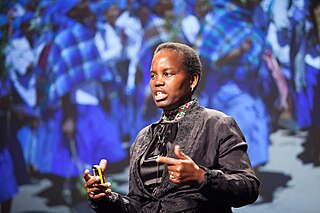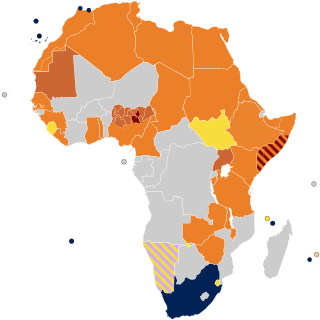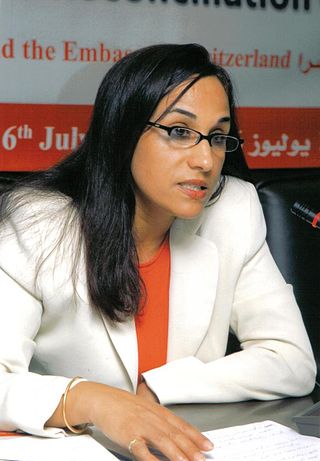
The Human Rights Commission of Pakistan (HRCP) is an independent, democratic non-profit organisation. Founded in 1987, it is one of the oldest human rights organisations in the country.
The International Federation for Human Rights is a non-governmental federation for human rights organizations. Founded in 1922, FIDH is the third oldest international human rights organization worldwide after Anti-Slavery International and Save the Children. As of 2020, the organization is made up of a federation of 192 organizations from 112 countries, including Israel and Palestine, including Ligue des droits de l'homme in over 100 countries.

Unity Dow is a Motswana lawyer, author, human rights activist and Member of parliament for Kgatleng West since November 2024. She formerly served as a judge on the High Court of Botswana and in various Botswana government ministries. Born in the Bechuanaland Protectorate to a seamstress and a farmer, who insisted on their children obtaining an education, Dow grew up in a traditional rural village before modernisation. She earned a law degree in 1983 from the University of Botswana and Swaziland, though her studies were completed in Swaziland and University of Edinburgh, Scotland, as Botswana had no law school at the time. After her graduation, Dow opened the first all-woman law firm in Botswana and in 1997 became the first woman to be appointed as a judge to the country's High Court.
The Gayssot Act or Gayssot Law, enacted on 13 July 1990, makes it an offence in France to question the existence or size of the category of crimes against humanity as defined in the London Charter of 1945, on the basis of which Nazi leaders were convicted by the International Military Tribunal at Nuremberg in 1945–1946.
Association Malienne des Droits de l'Homme (AMDH) is a Malian non-profit human rights non-governmental organization founded in Bamako, Mali on 11 December 1988.

Lesbian, gay, bisexual, transgender, and queer (LGBTQ) people in Botswana face legal issues not experienced by non-LGBTQ citizens. Both female and male same-sex sexual acts have been legal in Botswana since 11 June 2019 after a unanimous ruling by the High Court of Botswana. Despite an appeal by the government, the ruling was upheld by the Botswana Court of Appeal on 29 November 2021.

Lesbian, gay, bisexual, and transgender (LGBT) people in Sudan face significant challenges not experienced by non-LGBTQ residents. Same-sex sexual activity in Sudan is illegal for both men and women, while homophobic attitudes remain ingrained throughout the nation.

Lesbian, gay, bisexual, and transgender (LGBT) rights in Africa are generally poor in comparison to the Americas, Western Europe and Oceania.

Discussions of LGBTQI+ rights at the United Nations have included resolutions and joint statements in the United Nations General Assembly and the United Nations Human Rights Council (UNHRC), attention to the expert-led human rights mechanisms, as well as by the UN Agencies.
The Human Rights League was founded in Belgium on 8 May 1901, after the in 1898 established Ligue des Droits de l'Homme in France. The Belgian initiative came from Eugène Monseur, a professor at the Université libre de Bruxelles.
Walter Paul Khotso Makhulu is an emeritus South African-born Anglican archbishop of Central Africa.
Capital punishment in Botswana is a legal penalty, and is usually applied for murder under aggravated circumstances. Executions are carried out by hanging. Despite this, Botswana’s constitution guarantees right to life. It is the only country in Southern Africa that still uses capital punishment as a punishment.

The International Criminal Court investigation in Mali or the Situation in the Republic of Mali is an ongoing investigation by the International Criminal Court (ICC) into war crimes and other crimes within the ICC's jurisdiction that are alleged to have occurred during the Northern Mali conflict since January 2012. The investigation was requested by the government of Mali in July 2012. As the first person who pleaded guilty to a charge of the ICC, Ahmad al-Faqi al-Mahdi made a statement expressing remorse and advising others not to commit similar acts.

Sidiki Kaba is a Senegalese politician who served as the 15th Prime Minister of Senegal from 6 March 2024 to 3 April 2024.

Amina Bouayach is a Moroccan human rights activist. Since December 2018, Bouayach has served as the president of the Moroccan National Human Rights Council. In this role, she affirmed in 2019 that there are no "political prisoners in Morocco."
The Lesbians, Gays & Bisexuals of Botswana (LEGABIBO) is a Botswana human rights advocacy group with the primary objective of seeking legal and social rights for the LGBT community in Botswana. It is the first LGBT focused organization to be registered in Botswana after years of official opposition. The organization aims to reduce discrimination of LGBT individuals and advocate the recognition of same sex couples for the purpose of adoption, accessing social benefits and same-sex marriage.

Human rights in Senegal are generally better respected than in other countries in the continent, but cases of violation are still regularly reported.
Caine Youngman is a human rights activist and member of the LGBT rights movement in Botswana. He first gained international attention in 2011 when he tried to overturn the country's ban on same-sex relations. He worked for human rights group LEGABIBO until December 2022 and served on the board of Pan Africa ILGA, the regional chapter of the International Lesbian, Gay, Bisexual, Trans and Intersex Association.

Alice Bahumi Mogwe is a Motswana activist and lawyer. She is the founder and director of the human rights organization Ditshwanelo.











